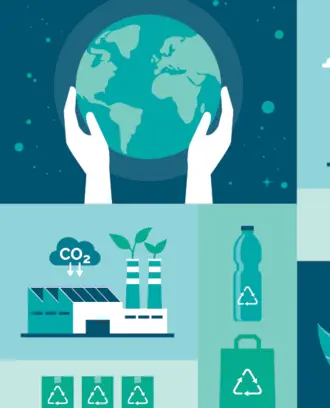“MIT is never better than when we come together to solve big problems,” said MIT President Sally Kornbluth in a video announcing the launch of the Climate Project at MIT.
This emphasis on collaboration was apparent during the MIT Sloan Climate Catalysts: Sparking Change event at the MIT Museum. Held shortly after the announcement of the MIT Climate Policy Center, the event celebrated MIT Sloan’s contributions to the climate space. The evening included lightning talks by MIT Climate Policy Center Faculty Director Christopher Knittel (George P. Schultz Professor of Energy Economics; Director, MIT Center for Environmental Energy and Policy Research; Professor, Applied Economics); Catherine Wolfram, PhD ’96 (William F. Pounds Professor of Energy Economics; Professor, Energy Economics) and Stwart Peña Feliz, MBA ’23 (Co-Founder and CEO, MacroCycle Technologies).
In addition to the lightning talks, the event included an introduction by Kathryn Hawkes (Senior Associate Dean, External Engagement) and an audience Q&A.
MIT Sloan as a leader in climate change
Knittel, who will be named associate dean of climate at MIT Sloan effective July 1, kicked off the lightning talks with an overview of the MIT Climate Policy Center. He explained that MIT is well-equipped to address climate change due to its strengths in multiple academic disciplines such as business, engineering, and science.
“Climate change is, by its nature, an interdisciplinary problem,” said Knittel. “We won't just solve it alone through technology. We need the other disciplines to solve climate change.”
The need for interdisciplinary research led to the launch of the Climate Project at MIT, an Institute-wide initiative to develop, deliver, and scale up climate solutions as quickly as possible. In February, President Kornbluth announced that MIT committed $50 million to jumpstart this initiative. The Climate Project at MIT will help develop technologies that tackle pressing climate issues such as decarbonizing industries, protecting land and oceans, empowering frontline communities most impacted by climate change, building and adapting resilient cites, and inventing new policy approaches.
MIT Sloan also announced a $25 million investment to endow the MIT Climate Policy Center, which will utilize the Climate Project at MIT’s research to help inform and support policymakers.
MIT Sloan Professor Christopher Knittel, who is the Faculty Director of the MIT Climate Policy Center, is the George P. Shultz Professor of Energy Economics and a Professor of Applied Economics at the MIT Sloan School of Management. He is also MIT Sloan's Associate Dean for Climate and Sustainability.
Credit: Tim Correira
“One of the gaps the MIT Climate Policy Center seeks to fill is being the connective tissue across all of these different centers to understand what the policy implications are and to understand how everything fits together,” said Knittel.
The MIT Climate Policy Center is also unique in how it will encourage collaboration between MIT researchers and policymakers. Knittel explained that academics are usually only evaluated on the academic research they publish. However, the MIT Climate Policy Center will evaluate researchers not only on their research, but also on how they use this research to engage with policymakers and inform legislation.
“That's what the MIT Climate Policy Center will do,” remarked Knittel. “It will take the tools and the abilities that we already have at MIT, but focus them in a way that's more useful to policymakers in DC, at the state level, and at the international level.”
Examining climate policy in 2025
invested by MIT Sloan to endow the MIT Climate Policy Center
Wolfram presented her research as an example of a project that the MIT Climate Policy Center could help share with policymakers.
She explained that former President Trump’s Tax Cut and Jobs Act (TCJA), which lowered individual income taxes, is set to expire in the election year of 2025. Therefore, the officials elected during the 2025 election will play a key role in designing future tax codes. The Inflation Reduction Act (IRA), the Biden administration’s signature climate policy, mainly operates through tax credits to promote investment in clean energy. Wolfram and her team modeled several scenarios to understand how future tax policies related to the IRA might shape carbon emissions and guide climate policy.
“What we want to do is think about what the budget and revenue implications of these different climate policies are for the government,” said Wolfram.
Wolfram explained that keeping the IRA as it is would drive down carbon emissions, but not by enough to meet the Biden administration’s 2030 goal of a 50% to 52% reduction relative to 2005 levels. She then presented the environmental and fiscal impacts of repealing and expanding the IRA. A fourth scenario produced the most favorable results. In addition to keeping the IRA in place, this scenario adds a carbon fee, a price on carbon emissions that can also help drive down emissions. Introducing a carbon fee at a certain level would increase the federal budget by just over $2 billion while reducing emissions enough to meet the Biden administration’s 2030 goal.
Wolfram has discussed the results of this research with lawmakers and government officials, exemplifying the collaboration between government and academia that the MIT Climate Policy Center could facilitate.
“We think it's really important to build the evidence base to put the numbers in front of staffers and let them know what [certain climate policies] would do in terms of emissions and what the revenue benefits would be,” said Wolfram.
Event speakers Stwart Peña Feliz, MBA ’23, Catherine Wolfram, PhD ’96, Christopher Knittel, and Kathryn Hawkes during the Q&A.
Credit: Tim Correira
Making a difference through entrepreneurship
Peña’s talk highlighted MIT Sloan’s role in fostering climate-focused student entrepreneurship. Peña is the co-founder and CEO of MacroCycle Technologies, which aims to create circular plastics with zero carbon emissions.
Peña explained that less than one-fifth of globally produced plastic is recycled. The rest of the plastic is either incinerated or goes into landfills and oceans. As a result, the plastic life cycle produces 4.5% of all global CO2 emissions. To combat this, MacroCycle uses a new method of recycling plastics that produces higher-quality plastics and is less energy-intensive than traditional methods of plastic recycling.
“At scale, MacroCycle can eliminate over 2% of all global CO2 emissions through our technology,” Peña noted.
Peña credits MIT Sloan with providing him with the tools and connections he needed to help bring this technology to the world. While at MIT Sloan, he met his co-founder, Jan-Georg Rosenboom, an MIT postdoc. After deciding to work together on MacroCycle, the co-founders received startup funding from the MIT Sandbox Innovation Fund Program and the MIT Climate & Energy Prize. They also participated in the Martin Trust Center for Entrepreneurship’s MIT delta v accelerator program, which provides students with resources and mentorship to develop their startups.
Although he graduated from MIT Sloan last year, MIT remains part of Peña’s entrepreneurial journey. He and Rosenboom are working on scaling MacroCycle at The Engine, an MIT spinout. Peña is excited to continue building MacroCycle’s team.
At MIT Sloan, he has seen how powerful collaboration can be.
“When you bring some of the greatest business-minded individuals together with people with technical and innovation skills, a lot of cool things can happen,” said Peña.





